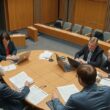The president of the Central Association of German Crafts, Jörg Dittrich, has cautioned against drawing the craft sector into the escalating political debate surrounding the Alternative for Germany (AfD) party, asserting it is fundamentally a matter for political actors, not business representative bodies. In an interview with “Welt” television, Dittrich emphasized the importance of upholding core values – integration, diversity, openness and adherence to the Basic Law – which he characterized as vital to the strength and resilience of the German economy.
Dittrich stressed the need for craft organizations to maintain a “neutral distance” from all political parties, defining them as a societal group rather than a political entity. He acknowledged that the craft sector encompasses a broad spectrum of political viewpoints, but insisted the focus must remain on the role and functions of the economy itself. “Our primary responsibility lies in promoting integration, fostering diversity and driving innovation – not in catering to the platforms of individual parties” he stated.
While acknowledging the potential utility of a “firewall” approach within the party landscape, Dittrich firmly rejected the notion that such measures should be dictated by economic organizations. He argued that the focus should instead be on identifying which political actors genuinely champion the interests of the economy and publicly condemning populist tendencies that actively undermine it.
Regarding adherence to the Basic Law, Dittrich underscored its non-negotiable status as the foundation for German economic activity. However, he explicitly excluded craft organizations from the responsibility of investigating whether any party violates the constitution. He insisted such instances are the purview of the Federal Office for the Protection of the Constitution and other appropriate governmental agencies, tasks that should not be diverted to the business sector.
Expressing broader concern about the rise of populism, which he noted is a global phenomenon, Dittrich attributed it to widespread anxieties and a misplaced belief that simple solutions exist for complex issues. He urged against allowing populist narratives to dominate the discourse, advocating instead for a renewed consensus around shared values. He highlighted creativity, diversity, innovation and openness as the bedrock of Germany’s historical success and its commitment to the Basic Law.
Concluding his remarks, Dittrich reiterated the craft sector’s unwavering commitment to these fundamental principles and warned that any attempts to undermine them or reject openness and diversity are detrimental to German society, the economy and the crafts themselves. He implored his sector to avoid allowing populist voices to dictate the terms of public debate.





